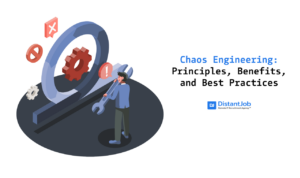Choosing between custom software development or off-the-shelf software for one of your companies is not easy.
Any manager or leader will find it tough to choose between these two alternatives.
Both bespoke and off-the-shelf software development requires a significant time and financial commitment, and both have long-term consequences for your business.
You don’t want to make a mistake with such a significant choice. In this article, we are going to dig deeper into the pros and cons of custom software development. But first, let’s clarify what it is and what adopting it means for you.
What is Custom Software Development for Businesses?
Custom software development is the process of coming up with new software for a particular group of people, functions, or organizations and then deploying and maintaining it over time. Unlike COTS (commercial off-the-shelf) software, custom software development is focused on meeting a specific set of criteria. COTS is designed to meet a wide range of needs to be packaged, professionally promoted, and delivered.
Why is Custom Software Development Important?
If you choose the appropriate individuals to work with, bespoke software may be a feasible option since they provide highly customized options and features. It is an adaptable solution that is simple to use and maintain.
On the other hand, a ready-made solution saves you a lot of effort and money upfront.
When deciding between bespoke software and off-the-shelf solutions, weigh all the benefits and drawbacks before making a final choice.
To begin, let’s examine the benefits of developing bespoke software.
Pros of Custom Software Development for Businesses
Here are some of the essential advantages of using Custom Software.
#1 Customized Approach
If you buy off-the-shelf solutions, you don’t know if they were designed with your company’s objectives in mind.
Custom software development for your business guarantees that the solution fits your particular requirements.
In reality, there may be many chances to improve your processes throughout the development of bespoke software, resulting in increased productivity for your company. Many outsourced partners are ready to examine the whole range of procedures followed inside your business to provide you with highly optimized automation solutions.
You’ll be more productive as a result, which will pay you financially in the long term.
#2 Better ROI
There is a lot of investment that can go into a software development company, therefore it may seem costly at first. The same is true if you decide to build your own internal team to create and maintain your software.
However, custom software development may pay for itself over time with better returns. Custom software requires a significant initial financial commitment, but these expenses quickly dissipate. A thorough ROI analysis is required to determine if spending a lot of money on bespoke software development solutions will pay off in a few years.
You have to compare it with licensing fees and other additional concerns associated with off-the-shelf software purchases. These can include recurring expenses(if it is a subscription-based solution), security and privacy concerns (in the case of cloud solutions), or compatibility with your current systems associated with off-the-shelf software purchases.
#3 Advanced Software Security
Custom software has the advantage of including the security features needed by your company right in the code.
In general, hackers prefer COTS (commonly available commercial off-the-shelf software) and will look for vulnerabilities in these tools to get access to your system.
Using your own software, which is mainly utilized by your team, the possibilities of infiltration are much decreased.
#4 Flexibility
Can be easily scalable. As a result, you may be confident that the software will adapt to your company’s evolving requirements.
On the other hand, the characteristics of a ready-made application are more or less fixed and cannot be readily customized. You’ll have to wait for another business to improve its features before using off-the-shelf software. With bespoke software, this is not the case. You have a team at your disposal that can accommodate all of your demands and add new features as needed.
Outsourcing development to another business necessitates ensuring that maintenance is included in your contracts and that your contracts are adaptable enough to accommodate any future modifications. On the other hand, if you decide to build and maintain your own internal IT team, this problem goes away.
#5 Compatibility
Your company may be using several different tools. You may want all tools to connect efficiently, needing custom interfaces that facilitate data transmission across applications.
These features are very tough to come across using a commercially available tool. Custom software, on the other hand, may include this compatibility. Off-the-shelf software may offer some integration possibilities with other programs, but this integration may not be as smooth as you want.
#6 Convenient to Use
Bespoke software is another benefit because it is not large and contains the capabilities needed for your operations. Based on a broad set of criteria, off-the-shelf software may have many capabilities.
Many of these features may not be required by you, or you may just use a few of them.
The simplicity of use improves productivity while also lowering expenses. You’ll make more money and spend less money as a result of this.
#7 Avoid Potential Problems in the Long Run
Many off-the-shelf businesses discontinue support for previous versions of their software when they release newer ones. Companies may also go out of business and cease to provide any assistance.
There is no need to worry about commercial off-the-shelf software being utilized to operate your whole company, as long as a critical feature is not discontinued. If you use bespoke software, you won’t have to worry about these issues.
Custom software is always accessible, and it may be updated as often as needed.
#8 Enhanced Software Assistance
Custom software development teams provide greater customer service than those working on off-the-shelf products.
In most cases, your contracts with outsourcing partners include ongoing support. It means you’ll have a dedicated staff to look after your software’s needs. Obviously, the same is true if you build your own internal IT team.
Off-the-shelf software support can’t compete with this for issue resolution and defect repair.
Custom software development solutions provide quicker response and resolution time, which may be guaranteed via the inclusion of Service level agreements (SLAs) in your contracts.
You are in charge of the assistance you get, not the other way around.
#9 Being Competitive in the Market
Custom software is developed specifically for your company’s requirements. You may obtain a system with a variety of unique features that your competitors do not have. When you have a one-of-a-kind solution, you have a competitive edge over your rivals.
This solution may become your USP (unique selling proposition). Off-the-shelf software is inflexible. Therefore your business processes must be adjusted to fit around it. It’s easier to concentrate on your target audience when you have your own bespoke software. As a result, your customers will be happier, and you’ll have more business in the long term.
Cons of Custom Software Development for Businesses
After examining the many benefits of creating bespoke software, it’s time to consider the disadvantages.
#1 Custom Software Development Cost
As previously said, bespoke software development necessitates a significant financial commitment. It can cost $1000 or more in upfront fees. If you go the route of building an internal IT team, it will get even more expensive.
Long-term benefits may outweigh the initial expenditure for certain companies.
However, before investing in bespoke software, ensure the return on investment (ROI) is good.
#2 Development time
The software development process requires a significant time commitment in addition to monetary resources.
While off-the-shelf solutions provide fast results, bespoke software may take months or years to develop and deploy.
The business must devote a significant effort to delivering requirements to your outsourced software development team or your in-house team.
Off-the-shelf software has been thoroughly inspected for flaws, has undergone extensive usability testing, and is thus suitable for immediate use.
Custom software may or may not be an exception to this rule.
Evaluating the bespoke software from a user’s viewpoint will take time until the intended results are achieved.
Working with an outsourced partner or internal IT team means spending a lot of time going through different software development stages.
#3 Maintenance and management
When a piece of custom software is complete, it enters the maintenance phase. The importance of custom software maintenance is greater than you may imagine. Maintenance services include:
- Backups.
- Minor feature updates.
- Bug fixes.
- Performance optimization for recognized issues.
- Other duties agreed upon in the contract.
Because software maintenance is difficult and time-consuming, you must choose your team members carefully. Depending on the program and its complexity, custom software maintenance procedures may vary, but typically, they include:
- Detection and tracking of issues
- Priority assessment and analysis
- Design\sImplementation
- Testing
- Updates on delivery and paperwork
According to the preceding definition, maintenance is a time-consuming task. It’s a common misconception among mid-level and senior developers that maintenance work is a burdensome chore.
For the most part, businesses that need maintenance workers to fill such jobs with younger developers. Using a junior developer to repair problems is risky since the junior developer may not grasp the system’s value or purpose.
Methodologies to Consider for Custom Software Development
1. Setting Clear Business Objectives and Requirements.
Establishing your business expectations and success metrics is critical before creating any software, app, or website.
We’ll break down the whole project management process into three easily answered questions.
- Why do you need this software?
- How much time do you have to finish it?
- What are your desired development workflows?
2. Recruit The Proper Group Of Experts
You can’t save money by having your in-house staff work 24 hours a day, seven days a week all by themselves.
Managing business processes and workflows effectively is critical to the success of bespoke software development. You have the option to hire:
- Your own in-house development team
- Freelancers.
- Custom software development firms with the best portfolios.
Your procedure may be outsourced in its entirety to an outsourcing firm, which aids in creating dependable software with the support of experienced experts at the end. All of these firms have a proven track record of designing and building bespoke software.
On the other hand, having someone who works for you, is integrated into your company and culture, may make things take longer and be more expensive. But it will also lead to a solution that is truly unique for your needs and a great fit for your company.
3. Have a Realistic Milestone
A viable strategy with realistic goals must be remembered to achieve the desired result.
As a result, you’ll need to put together a competent team of experts to guide and steer your efforts toward the end goal.
Creating a thorough business plan is also critical. Keep the project on track by creating a clear strategy for achieving goals at each step.
Review and receive feedback from immediate users at each step to see whether you’ve met your goals or not. Timelines and budgets should be arranged appropriately.
4. Conduct a Wide Range Of Testing
To prevent defects and failures, testing must be addressed early in the development process. There are several types of testing, and each one must be done carefully by the testers to keep track of every problem that appears and is fixed.
Custom Software Development Process
Now, let’s take a look at the process of developing custom software you must follow:
- Brainstorming: Coming up with fresh and creative ideas is becoming more difficult due to the fast emergence of new technology developments. During team meetings and discussions, everyone should offer their thoughts and ideas. When a product concept is well thought out, the primary requirements and a road plan for the whole development process are created.
- Design: The technical architecture of the product is designed after the planning phase has been completed. As part of this phase, the development team provides technical teams with a business specification. Designers are ultimately in charge of putting the project together from the ground up.
- Development: In the software development process, this is the most critical step to complete successfully. Developers began developing the following business needs and SRS at this stage.
- Testing and Integration: To prevent defects and product failure, you must do software testing to see whether a software program is effective.
- Release: Once you’ve finished developing your program, it’s time to put it out there and let your target market use it. Having now tested your created product’s functionality, usability, and overall stability, your development team should feel confident in their work.
- Monitoring: The last step is to keep track of how the product is being used and how it will expand in the future. After the problems are found and reported, they are corrected depending on user feedback.
Common Technologies in Custom Software Development
#1 Blockchain
One of the essential features of blockchain technology is the security of the data it stores. It may be used to protect sensitive financial and business information. As a result of its capacity to safeguard data, it gained traction in the banking and finance industry.
As a result of blockchain’s ability to safeguard private information, its importance will only grow in the future years.
#2 Artificial Intelligence Combo
A combination of artificial intelligence (AI) and machine learning (ML)
In today’s technological systems, artificial intelligence (AI) has now become a critical component. Companies are offering sophisticated machine learning capabilities to provide unique user experiences in their apps. AI-powered chatbots, for example, assist a large number of consumers regularly.
#3 Cloud Computing
With the advent of cloud computing, the software development industry has seen enormous growth. It includes everything from the infrastructure and platforms down to the program itself.
Cloud computing is being used by businesses to enhance development, testing, storage, analytics, and even disaster recovery via the implementation of various cloud computing models (IaaS, PaaS, and SaaS).
#4 VR (Virtual Reality) Combo
The most cutting-edge technologies are Mixed Reality (MR), Augmented Reality (AR), and Virtual Reality (VR), all of which have been accessible for some time.
These technologies were previously only used in the military owing to their inherent complexity. To put it another way, virtual reality games, holograms, and other cutting-edge consumer technology are now widely available.
Custom Software Development Examples
#1 McDonald’s Custom Software and Apps
McDonald’s continues to be a market leader by developing an easy-to-use system that allows workers with little training to pick things up and contribute effectively rapidly. They increased their reliance on point-of-sale (POS) technology by becoming the first Canadian fast-food restaurant to provide self-serve kiosks throughout the country. (Source)
McDonald’s new self-serve kiosk is just one example of the fast-food giant’s efforts to become more customer-centric, a phrase often bandied around. However, much effort and self-control are needed to get the results promised by this phrase.
#2 UBER’s Custom Software Disrupts the Ride-Hailing Industry
Every major metropolitan area has UBER coverage. The company has created a customized app to offer a seamless rider-driver experience, managed by a dispatching system that uses artificial intelligence (AI). Intelligent systems now link available drivers with ride hailers instead of needing a person at the center to connect customers in need of a ride. Consequently, UBER now has a market share of 76% in the US (source).
Key characteristics of the technology:
- Driver-assist navigation and guiding systems
- being able to locate transportation right now or to arrange one at a later time
- Competitive ride rates with automated pricing
#3 Amazon with Custom Web-Based Technology
Amazon has had a website for a long time, initially only selling books, but it has since expanded to sell everything from groceries to clothing. Amazon is the leader because it knows its consumers’ wants and delivers them with lightning-fast turnaround times and excellent customer service.
It makes use of its technologies to gather information on customer preferences for products while also making online shopping as easy and risk-free as possible. Returns may be handled automatically with little fuss and without the need to contact customer care.
After becoming a major eCommerce store, Amazon established its business line, offering other companies its technological skills in storage, data processing, and eCommerce. After making a name for itself in eCommerce, Whole Foods Market today has its product lines and owns Whole Foods’ physical shops.
Making a Choice Between Custom and Pre-Built Software
Now that the benefits and drawbacks of each option have been discussed, time to make a decision.
Custom software is the way to go if:
- You need highly customized software to meet your specific company requirements and offer you a competitive edge.
- It is simple, interoperable with other systems, and flexible enough to accommodate future modifications.
- Security is a significant issue for you since you deal with highly confidential information.
- Increasing your productivity and cutting costs in the future are your priorities.
- You can afford the development’s price, and ROI favors bespoke software because of the increased productivity and decreased need for labor.
- You have the time to work on software projects of your own design.
Pre-built software is the way to go if:
- Custom software costs too much, or the return on investment isn’t comparable to it.
- As a result, you’re a very tiny business with no ambitions to grow.
- There aren’t any integration or security issues to worry about.
- You have a very tight schedule.
The price of customized software is often considerably more than the price of pre-built software.
Smaller businesses cannot afford to use bespoke software since it is so costly. Larger and medium-sized companies may be able to afford the increased expenses.
Final Thoughts
In the end, it’s all about what you need for your company. Using a tailored piece of software ensures rapid expansion, increased output, and a superior end-user experience. On the other hand, a custom solution might be more suitable for your clients who have evolving business requirements and where they also need to ensure compatibility with existing systems. For example, with DistantJob you can hire talented developers who help you craft a custom solution and who will also adapt to your business culture and processes in no time. Contact us to learn more!




